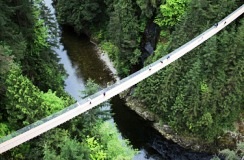Stroll the 1.3-mile Hudson River Walkway in Poughkeepsie, NY—taking
in the exhilarating view of water, treetops, and sky—and you could
almost forget that we live in a world designed for the automobile. Here,
the environment belongs not to those who roar by at 70 mph, but to
pedestrians like you.
The concept of pedestrian bridges isn't new—Venice's Rialto Bridge dates back to 1588, and even the Brooklyn Bridge architects made room for walkways alongside the car lanes. But just recently, since around the turn of the millennium, we've rediscovered the notion that regular people are important enough to deserve some spectacular feats of engineering.
Sure, these pedestrian bridges make a big impression with sweeping
views and innovative features like solar-powered LED lighting or the
ability to levitate and roll upwards into a wheel. But above all, they
reward us for traveling, whether on foot or two wheels, with our own
muscle power.
Capilano Suspension Bridge, Vancouver, British Columbia
Capilano Suspension Bridge, Vancouver
Photo Courtesy of Capilano Suspension Bridge
Come face-to-face with wildlife in Vancouver's lush treetop ecosystem
while strolling this skinny 450-foot-long canopy bridge that floats 230
feet above the Capilano River. Just 10 miles from downtown, the bridge
dates back to 1889, when a Scottish civil engineer strung a hemp rope
and cedar plank to his isolated cabin.
A Growing Trend: The Capilano forest also features a new
650-foot-long network of bridges and viewing platforms connecting
several of the towering Douglas fir trees. And the concept has taken
hold—canopy walks have lately been built in the Peruvian Amazon
rainforest and Borneo's Danum Valley.

No comments:
Post a Comment